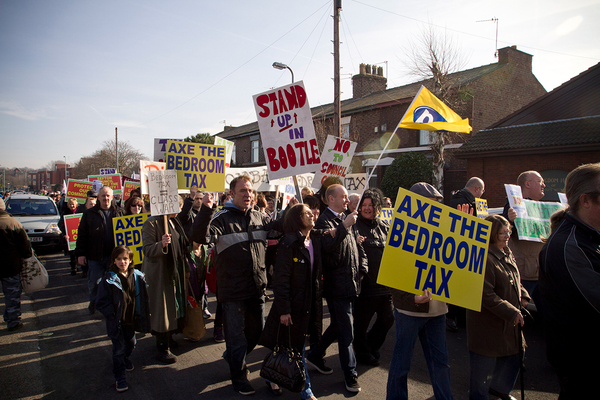You are viewing 1 of your 1 free articles
 Jules Birch
Jules BirchProtests in Berlin should serve as a warning to policymakers here
As thousands march through the German capital, Jules Birch considers what lessons there are for the UK housing sector
The large demonstrations in Berlin on Saturday demanding the expropriation of the property of the city’s two biggest landlords are a warning to their counterparts in this country about what can happen when public and political opinion turns against you.
Yes, there is a particular context for the demos, with communism in East Berlin and an expectation of cheap rents in West Berlin predating the free market pressures of a global capital city.
And yes we are talking about two large private corporate landlords that own more than 100,000 homes each.
But to bring things closer to home, both companies identified in the protestors’ placards – Deutsche Wohnen in particular but also Vonovia – have their roots in social housing and grew out of communal housing associations. Much of Deutsche Wohnen’s stock comes from the privatisation of municipal housing in Berlin since reunification, while Vonovia has its roots in not-for-profit housing for employees.
In the German press, the rivalry between them is portrayed as a clash between the giant egos of their two chief executives. Vonovia failed with a €14bn hostile takeover of Deutsche Wohnen in 2016.
In the context of the UK I can only think of one example of outright privatisation of housing on that sort of scale.
That was the disastrous (for the taxpayer) sale of 60,000 Ministry of Defence homes to Annington Homes in 1996 – and there is a connection in that Annington used to own one part of Vonovia.
The Right to Buy is another form of privatisation, of course, and on an even bigger scale, but housing was not sold off directly to the private sector in the same way as the public utilities were and it is only with subsequent sales that homes have ended up in the hands of investors.
Some see stock transfer as privatisation and point to a series of battles over estate regeneration as evidence to back that up.
However, it could also be argued that it is precisely the hybrid public-private status of housing associations that has enabled us to avoid the sort of ownership model and consequences seen in Berlin.
Wherever you stand on that, a series of recent developments suggest that the boundaries between public and private, and profit and not-for-profit are becoming even more blurred than they already were and that public, political and media perceptions of housing associations are changing as a result:
- The Channel 4 documentary that called housing associations ‘new landlords from hell’ and caused Sanctuary to refer itself to the regulator – it was noticeable that almost every home featured looked like it was a former council house.
- The rise of for-profit providers and the regulatory issues that raises – is it possible to draw a clear demarcation between for-profit and not-for-profit?
- Growing involvement of US investors and hedge funds in UK rented housing – what better place to invest than homes with underlying value that would be released by deregulating their rents?
- The rise of the corporate landlord – a story in the Financial Times over the weekend featured build-to-rent tenants complaining about rent increases, repairs and management.
It was noticeable that neither the tenants nor the FT made any distinction between private landlords and housing associations.
“Large housing associations now have the financial strength to be not-for-profit alternatives to commercial house builders and developers, but they also need to do much more to distinguish themselves from the private sector and to be more accountable to their communities and their residents”
- Complaints raised by housing association leaseholders and MPs in a recent parliamentary report on the leasehold scandal.
- L&Q’s expansion into the North West – whatever the merits of the deal in terms of new homes and improvements to existing ones, would Trafford Council tenants have voted to transfer their homes to a housing association if they had known that 14 years later they would read in the FT that it has become a hedge against London property prices?
None of this is to suggest that the big English associations are no different from Deutsche Wohnen and Vonovia, or that we are about to see mass demonstrations in London demanding that they should be expropriated.
It does, though, suggest some issues that will not go away. Large housing associations now have the financial strength to be not-for-profit alternatives to commercial house builders and developers, but they also need to do much more to distinguish themselves from the private sector and to be more accountable to their communities and their residents.
There is one clear difference though.
David Montague, chief executive of L&Q, wrote for Inside Housing in 2017 about the upsides and downsides of being listed on the stock exchange after meeting his counterpart at Vonovia:
“But the words of a colleague always stuck with me. ‘When you are listed, everything is about profit. It doesn’t matter what you think your purpose is, it will become profit.’
“Chilling words, and a future we should avoid at all costs.
“It wouldn’t surprise me if share capital played a greater role in the future of the sector but L&Q is and will always be a regulated charitable housing association.”
That line in the sand seems clear but the siren calls of the stock market and greater commercial freedom have attracted some in the sector in the past and no doubt will do again in the future.
If the fate of the former building societies that converted to plc status only to end up as empty brands owned by the banks they once rivalled were not enough of a warning, then the demonstrations in Berlin show where that can lead.









